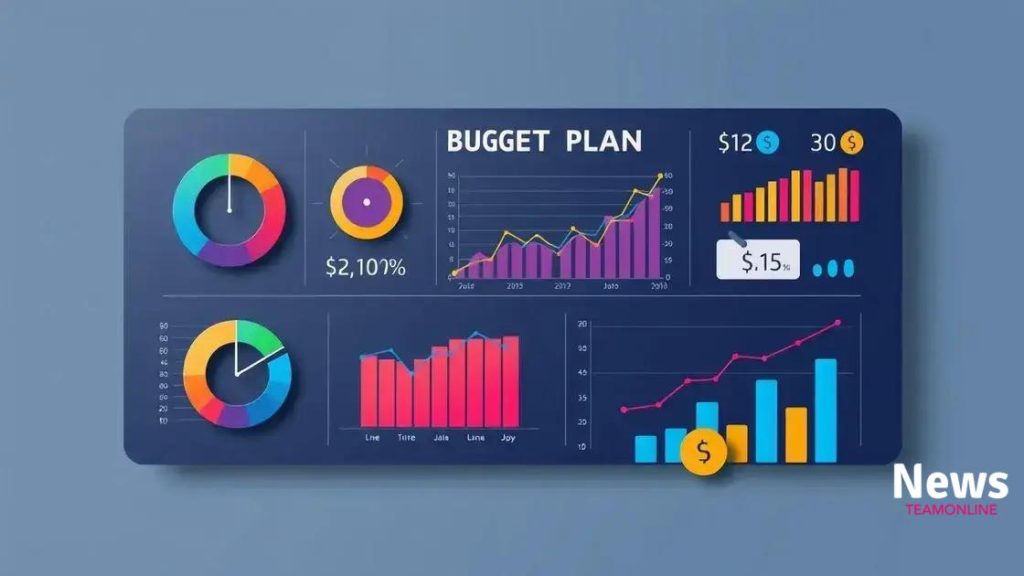Budget deviation tracker: how to manage your finances effectively

A budget deviation tracker helps individuals monitor their actual spending against their planned budget, allowing for timely adjustments and improved financial management.
Budget deviation tracker plays a crucial role in managing your finances effectively. Have you ever wondered how tracking your budget deviations can lead to better financial decisions? Let’s dive into this essential tool for financial success.
Understanding budget deviation tracking
Understanding budget deviation tracking is essential for effectively managing your finances. Many people struggle to keep their expenses within limits, resulting in budget deviations that can lead to financial stress. This section will explore the significance of tracking these deviations and how it can help you regain control over your budget.
What is Budget Deviation Tracking?
Budget deviation tracking involves monitoring the differences between your planned budget and your actual spending. By regularly reviewing these deviations, you can identify patterns and adjust your budget accordingly. This process enables you to stay informed about your financial habits and make necessary changes.
Why is it Important?
Tracking budget deviations is not just about numbers; it’s about understanding your spending behavior. Here are a few key reasons why it’s important:
- Helps you identify overspending areas.
- Encourages better financial decision-making.
- Facilitates financial goal achievement.
- Allows for timely adjustments to your budget.
As you track your budget deviations, you may notice recurring expenses that exceed your expectations. Recognizing these trends early can help you recalibrate your financial strategy. It also fosters a proactive rather than reactive approach to finance, which is vital for long-term success.
Another important aspect is setting up a consistent review schedule. Whether it’s weekly or monthly, regular check-ins on your budget can make a significant difference. By doing this, you can identify deviations before they lead to larger financial problems. This practice promotes accountability in your financial management.
In conclusion, understanding budget deviation tracking empowers you to take charge of your finances. The insights gained through this process can turn your financial struggles into successes.
Importance of tracking deviations
The importance of tracking deviations in your budget cannot be overstated. By monitoring where you stray from your planned spending, you gain valuable insights into your financial habits. This process not only highlights areas of overspending but also encourages a more thoughtful approach to your finances.
Benefits of Tracking Deviation
When you actively monitor budget deviations, you can reap numerous benefits:
- Improved financial awareness.
- Enhanced ability to identify unnecessary expenses.
- Greater accountability in spending habits.
- Informed decision-making for future budgeting.
Understanding these benefits helps cultivate a mindset geared towards financial responsibility. As you keep tabs on your spending, you’ll start to see patterns emerge. Recognizing these can guide you in making necessary adjustments to your budget.
Real-Time Adjustments
Another critical aspect of tracking deviations is the ability to make real-time adjustments. If you notice a certain area where you tend to overspend, acting quickly can prevent habit formation. For example, if dining out costs exceed your expectations, you might choose to limit takeout meals and explore more budget-friendly dining options.
This proactive approach to financial management can help you stay on track and meet your financial goals. Regularly reviewing your budget ensures that you remain aware of your financial situation and helps you prepare for unexpected expenses.
Ultimately, the importance of tracking deviations lies in its role as a tool for financial empowerment. By knowing exactly where your money goes, you can create a budget that truly reflects your needs and priorities.
How to set up a budget deviation tracker

Setting up a budget deviation tracker is a straightforward process that can lead to better financial management. By creating a system to monitor your spending against your budget, you empower yourself to make informed decisions about your finances.
Choosing the Right Tracking Method
First, decide on a method that works best for you. You can use various tools:
- Spreadsheets on platforms like Google Sheets or Excel.
- Mobile apps designed for budgeting.
- Pencil and paper for those who prefer a hands-on approach.
Each method has its advantages, so choose one that fits your style and allows you to keep track easily.
Creating Your Budget
Before tracking deviations, you need a clear budget. Start by listing all your income sources and expenses. Categorize your expenses into fixed (like rent) and variable (like dining out). This will provide a solid foundation for your budget.
Next, allocate a realistic amount for each category, considering your financial goals. Once your budget is set, it’s time to implement your budget deviation tracker.
Regular Monitoring
Monitoring should be done regularly. Set a schedule, whether it’s weekly or monthly, to review your budget and actual spending. During these reviews, compare your actual expenses against your budgeted amounts. Note any deviations that occur.
Record those deviations to see where you are overspending or underspending. Analyzing these patterns helps you adjust your budget as needed and prevents future deviations from becoming larger problems.
By establishing this tracking method, you’ll foster a deeper understanding of your finances, making you better equipped to handle your budget over time.
Tips for analyzing budget deviations
Analyzing budget deviations effectively is crucial for improving your financial planning. With the right approach, you can turn deviations into valuable insights that help refine your budgeting process.
Set Clear Review Periods
Establish a consistent schedule for reviewing your budget. Monthly reviews are common and allow you to see trends over time. During these sessions, you can compare your actual spending against what you had budgeted. This practice gives you a clear view of where your money is going.
Identify Patterns
As you analyze your budget deviations, look for trends. Are you consistently overspending in certain areas? Identifying these patterns is essential to understanding your financial habits. For instance, if dining out is a repeated issue, it might be time to set stricter limits in that category.
- Review categories where overspending occurs.
- Consider monthly fluctuations and recurring expenses.
- Analyze seasonal trends, like holiday spending.
Recognizing these patterns empowers you to make informed changes to your budget that can prevent future deviations.
Use Visual Tools
Visualization can be a powerful tool when analyzing your budget deviations. Graphs and charts make it easier to see your spending patterns at a glance. Use tools like budgeting apps or spreadsheets that offer visual representations of your financial data.
By visualizing your budget, you can quickly spot discrepancies and understand where adjustments need to be made. This method is often more impactful than simply looking at numbers on a page because it highlights the relationships between different spending categories.
Engaging with your financial data through analysis ensures you stay on track with your budget. By using these tips, you enhance your understanding of your finances and position yourself for improved budgeting success.
Common mistakes in budget management
Understanding common mistakes in budget management can help you avoid pitfalls that may derail your financial goals. Many people unknowingly make errors that lead to budget overruns. By recognizing these mistakes, you can adjust your approach to budgeting and improve your financial health.
Not Tracking Your Spending
One critical mistake is failing to track your spending accurately. Without monitoring where your money goes, it’s easy to overspend. Use tools like apps or spreadsheets to stay informed about your transactions. Regular tracking helps you stick to your budget and identify areas that need adjustments.
Overly Ambitious Budgeting
Setting unrealistic budget goals is another frequent error. If your expectations are too high, you’re likely to feel frustrated and give up on your budgeting efforts. Instead, set achievable goals and gradually adjust your budget as needed. This approach makes it easier to adhere to your financial plan.
- Start with small, achievable targets.
- Gradually increase your savings goals.
- Adjust your budget based on actual spending patterns.
Adjusting your expectations based on real-life experiences can lead to a more sustainable budgeting process.
Ignoring Irregular Expenses
Many individuals overlook irregular expenses when forming their budgets. Things like car repairs or medical bills can arise unexpectedly, causing significant strains on your finances. Always allocate a portion of your budget for irregular expenses; this buffer will help you avoid surprises.
By preparing for the unexpected, you can maintain your budget integrity even in the face of unforeseen costs. Integrating these elements into your budget planning helps build resilience and confidence in your financial management.
Neglecting to Review Your Budget
Finally, failing to review your budget regularly can lead to outdated financial plans. Situations change, and so should your budget. Set a regular review schedule, whether monthly or quarterly, to assess your budget’s effectiveness. This practice allows you to adjust for life changes, such as new expenses or changes in income.
By being aware of these common mistakes in budget management, you can enhance your budgeting skills, leading to better financial control and peace of mind.
In conclusion, managing your budget effectively requires awareness and strategy. Recognizing common mistakes, such as not tracking your spending or ignoring irregular expenses, leads to better financial control. Regularly reviewing your budget and being adaptable to changes will empower you on your financial journey. With the right tools and insights, you can achieve your financial goals and live within your means.
FAQ – Frequently Asked Questions about Budget Management
What is budget deviation tracking?
Budget deviation tracking is the process of comparing your planned budget to actual spending to identify and analyze differences.
Why is it important to monitor budget deviations?
Monitoring budget deviations helps you understand spending patterns, stay accountable, and make necessary adjustments to your financial plan.
How can I avoid common budgeting mistakes?
To avoid common mistakes, track your spending consistently, set realistic goals, prepare for irregular expenses, and regularly review your budget.
What tools can I use for effective budget management?
You can use budgeting apps, spreadsheets, or even pen and paper to help track your income, expenses, and budget deviations effectively.





